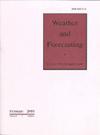The Development of a Consensus Machine Learning Model for Hurricane Rapid Intensification Forecasts with Hurricane Weather Research and Forecasting (HWRF) Data
IF 3.1
3区 地球科学
Q2 METEOROLOGY & ATMOSPHERIC SCIENCES
引用次数: 3
Abstract
This study focused on developing a consensus machine learning (CML) model for tropical cyclone (TC) intensity-change forecasting, especially for rapid intensification (RI). This CMLmodelwas built upon selected classical machine learning models with the input data extracted from a high-resolution hurricane model, the HurricaneWeather Research and Forecasting (HWRF) system. The input data contained 21 or 34 RI-related predictors extracted from the 2018 version of HWRF (H218). This study found that TC inner-core predictors can be critical for improving RI predictions, especially the inner-core relative humidity. Moreover, this study emphasized that the importance of performing resampling on an imbalanced input dataset. Edited Nearest Neighbor and Synthetic Minority Oversampling Technique improved the Probability of Detection (POD) by ∼10% for the RI class. This paper also showed that the CML model has satisfactory performance on RI predictions compared to the operational models. CML reached 56% POD and 46% False Alarm Ratio (FAR), while the operational models had only 10 to 30% POD but 50 to 60% FAR. The CML performance on the non-RI classes was comparable to the operational models. The results indicated that, with proper and sufficient training data and RI-related predictors, CML has the potential to provide reliable probabilistic RI forecasts during a hurricane season.基于飓风天气研究与预报(HWRF)数据的飓风快速强化预测共识机器学习模型的开发
本研究的重点是开发一个用于热带气旋(TC)强度变化预测,特别是快速增强(RI)的一致性机器学习(CML)模型。该CML模型建立在选定的经典机器学习模型的基础上,输入数据从高分辨率飓风模型——飓风天气研究和预测(HWRF)系统中提取。输入数据包含从2018版HWRF(H218)中提取的21或34个RI相关预测因子。这项研究发现,TC内核预测因子对于改善RI预测至关重要,尤其是内核相对湿度。此外,本研究强调了对不平衡输入数据集进行重新采样的重要性。编辑的最近邻和合成少数过采样技术将RI类的检测概率(POD)提高了约10%。本文还表明,与操作模型相比,CML模型在RI预测方面具有令人满意的性能。CML达到56%的POD和46%的误报率(FAR),而运营模型只有10%到30%的POD,但FAR只有50%到60%。非RI类的CML性能与操作模型相当。结果表明,有了适当和充分的训练数据和RI相关预测因子,CML有可能在飓风季节提供可靠的概率RI预测。
本文章由计算机程序翻译,如有差异,请以英文原文为准。
求助全文
约1分钟内获得全文
求助全文
来源期刊

Weather and Forecasting
地学-气象与大气科学
CiteScore
5.20
自引率
17.20%
发文量
131
审稿时长
6-12 weeks
期刊介绍:
Weather and Forecasting (WAF) (ISSN: 0882-8156; eISSN: 1520-0434) publishes research that is relevant to operational forecasting. This includes papers on significant weather events, forecasting techniques, forecast verification, model parameterizations, data assimilation, model ensembles, statistical postprocessing techniques, the transfer of research results to the forecasting community, and the societal use and value of forecasts. The scope of WAF includes research relevant to forecast lead times ranging from short-term “nowcasts” through seasonal time scales out to approximately two years.
 求助内容:
求助内容: 应助结果提醒方式:
应助结果提醒方式:


